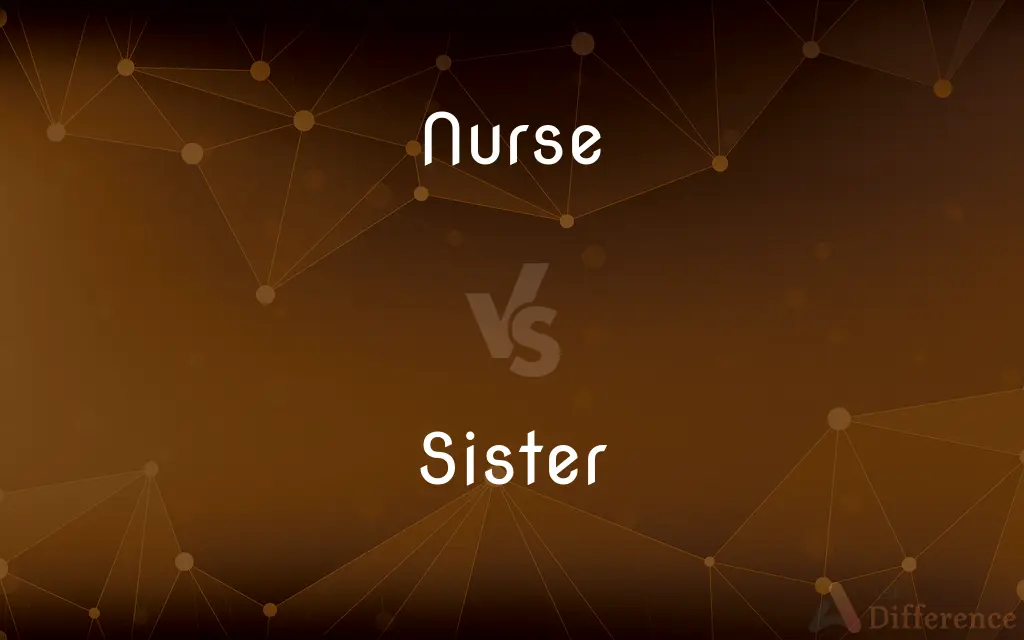Nurse vs. Sister — What's the Difference?
By Urooj Arif & Fiza Rafique — Updated on February 29, 2024
A nurse is a healthcare professional trained to care for the sick or injured, regardless of gender, while a sister, in the healthcare context, refers to a senior nurse, usually in charge of a ward in countries like the UK, reflecting a traditional term.

Difference Between Nurse and Sister
Table of Contents
ADVERTISEMENT
Key Differences
Nurses are key healthcare professionals who provide direct patient care, perform medical procedures under a doctor's supervision, and offer emotional support to patients and their families. Their roles vary widely, encompassing registered nurses (RNs), licensed practical nurses (LPNs), and nurse practitioners (NPs), among others. The title "sister" is used primarily in the UK and some Commonwealth countries to denote a senior nurse, equivalent to a charge nurse or nursing supervisor in other regions.
The term "nurse" is gender-neutral, covering all individuals in the nursing profession. The term sister has historical roots and is traditionally used in hospitals to signify a nurse who oversees a ward or unit, coordinating patient care, managing staff, and ensuring that healthcare practices meet the required standards. Despite its origins, the role focuses on leadership within nursing teams rather than religious duties.
The scope of practice for nurses can range from basic care to advanced medical procedures depending on their qualifications, the sister's role is more administrative and leadership-oriented, ensuring efficient operation of hospital wards or units. Nurses might specialize in various fields, like pediatrics or oncology, but sisters have usually gained experience in multiple areas of nursing before taking on their supervisory role.
Both roles are integral to the healthcare system, with nurses providing essential bedside care and sisters ensuring that wards run smoothly and efficiently. The transition from nurse to sister involves additional training, experience, and often, formal leadership or management qualifications.
The distinction also highlights the hierarchical structure within nursing, where individuals can advance their careers from direct patient care roles to more administrative and leadership positions. Despite differences in responsibilities, both nurses and sisters are committed to patient welfare and the smooth operation of healthcare services.
ADVERTISEMENT
Comparison Chart
Definition
A healthcare professional trained in caring for the sick or injured.
A senior nurse, usually in charge of a hospital ward or unit.
Role
Provides direct patient care, performs medical procedures, offers emotional support.
Oversees ward/unit operations, manages staff, coordinates patient care.
Scope
Can include basic to advanced care, depending on qualifications.
More focused on administrative and leadership responsibilities.
Qualifications
Ranges from diploma to advanced degrees in nursing.
Requires nursing qualifications plus experience and often leadership training.
Context
Used globally, gender-neutral term.
Used mainly in the UK and some Commonwealth countries, traditional term.
Compare with Definitions
Nurse
A caregiver who performs healthcare procedures.
The nurse performed wound care for patients post-surgery.
Sister
Sometimes used as a term of address for attractive young women
Nurse
An advocate for patient well-being within the healthcare system.
The nurse advocated for her patient's needs during the treatment planning.
Sister
A leadership role within nursing, overseeing patient care operations.
The sister conducted a meeting to discuss ward improvements.
Nurse
A healthcare worker involved in patient assessment.
The nurse assessed the patient's condition and reported to the doctor.
Sister
A nurse with administrative and supervisory duties.
The sister organized the shift schedules and managed ward resources.
Nurse
A professional providing patient care in various healthcare settings.
The nurse administered medication and monitored the patient's recovery.
Sister
The title for a nurse responsible for a specific hospital area.
The sister on the pediatric ward implemented new patient care protocols.
Nurse
Someone trained to assist doctors and care for patients.
Nurses play a crucial role in patient education and support.
Sister
A senior nurse in charge of a ward or unit in a hospital.
The sister coordinated the nursing staff to ensure all patients received timely care.
Nurse
A person trained to provide medical care for the sick or disabled, especially one who is licensed and works in a hospital or physician's office.
Sister
A nursing position requiring extensive experience and training.
After years of service, she was promoted to sister, recognizing her leadership skills.
Nurse
A person employed to take care of a young child.
Sister
A sister is a woman or girl who shares one or more parents with another individual. The male counterpart is a brother.
Nurse
A woman employed to suckle children other than her own; a wet nurse.
Sister
A female having the same parents as another or one parent in common with another.
Nurse
To try to cure by special care or treatment
Nurse a cough with various remedies.
Sister
A woman fellow member, as of a sorority.
Nurse
To treat carefully, especially in order to prevent pain
He nursed his injured knee by shifting his weight to the other leg.
Sister
A fellow woman.
Nurse
To serve as a nurse.
Sister
A close woman friend or companion.
Nurse
A person (usually a woman) who takes care of other people’s young.
They hired a nurse to care for their young boy.
Sister
A fellow African American woman or girl.
Nurse
Serve as a nurse; care for sick or handicapped people
Sister
A woman who advocates, fosters, or takes part in the feminist movement.
Nurse
Treat carefully;
He nursed his injured back by liyng in bed several hours every afternoon
He nursed the flowers in his garden and fertilized them regularly
Sister
A female member of a religious order; especially one devoted to more active service; (informally) a nun.
Michelle left behind her bank job and became a sister at the local convent.
Sister
To be sister to; to resemble closely.
Sister
A female person who has the same parents as another person;
My sister married a musician
Sister
A female person who is a fellow member of a sorority or labor union or other group;
None of her sisters would betray her
Common Curiosities
Can men be referred to as "sister" in nursing?
Traditionally, "sister" referred to female nurses, but as the term becomes less common and roles become more inclusive, male nurses in equivalent positions are often called "charge nurse" or "senior nurse."
How does one become a sister in nursing?
Becoming a sister requires several years of nursing experience, demonstrated leadership abilities, and often additional qualifications in healthcare management or leadership.
What qualifications are needed to become a nurse?
Qualifications range from diplomas and associate degrees to bachelor's and master's degrees in nursing, depending on the level of nursing practice.
Is there a difference in salary between a nurse and a sister?
Generally, sisters, due to their senior and supervisory roles, earn higher salaries than staff nurses.
What impact do sisters have on hospital operations?
Sisters play a crucial role in coordinating care, managing staff, and ensuring that healthcare services are delivered effectively and efficiently.
Do sisters still provide patient care?
While their primary role is administrative and supervisory, sisters may still engage in direct patient care, especially in situations requiring experienced nursing judgment.
Is the term "sister" still used in modern healthcare?
Yes, the term is still used in the UK and some Commonwealth countries, though its usage may vary with local hospital policies and cultural preferences.
What's the difference in responsibilities between a nurse and a sister?
Nurses focus on direct patient care, while sisters have administrative and leadership responsibilities, overseeing the operation of wards or units.
What skills are important for a sister in nursing?
Leadership, communication, organizational, and advanced clinical skills are crucial for effectively managing a ward or unit.
How does the role of a sister differ in private vs. public healthcare settings?
While the core responsibilities remain similar, the specific duties and operational focus may vary based on the healthcare setting's policies, resources, and patient demographics.
How is the nursing hierarchy structured?
The nursing hierarchy typically ranges from entry-level positions (e.g., nursing assistants) to advanced practitioners (e.g., nurse practitioners) and administrative roles (e.g., sisters, nursing directors).
Can a sister perform medical procedures?
Sisters, with their nursing background, are qualified to perform medical procedures, though their day-to-day duties may focus more on administrative tasks.
What are the career progression opportunities for nurses?
Nurses can advance to senior clinical roles, specialize in fields like midwifery or anesthesia, or move into administrative positions like sister, nurse manager, or healthcare executive.
How do nurses and sisters contribute to patient care?
Nurses provide essential bedside care and support, while sisters ensure that the care environment is managed efficiently for optimal patient outcomes.
Why is the term "sister" used for nurses?
The term has historical origins, reflecting a time when nursing roles were often filled by nuns; it signifies a position of authority and care within the hospital.
Share Your Discovery

Previous Comparison
Yakisoba vs. Soba
Next Comparison
Paper vs. PageAuthor Spotlight
Written by
Urooj ArifUrooj is a skilled content writer at Ask Difference, known for her exceptional ability to simplify complex topics into engaging and informative content. With a passion for research and a flair for clear, concise writing, she consistently delivers articles that resonate with our diverse audience.
Co-written by
Fiza RafiqueFiza Rafique is a skilled content writer at AskDifference.com, where she meticulously refines and enhances written pieces. Drawing from her vast editorial expertise, Fiza ensures clarity, accuracy, and precision in every article. Passionate about language, she continually seeks to elevate the quality of content for readers worldwide.












































